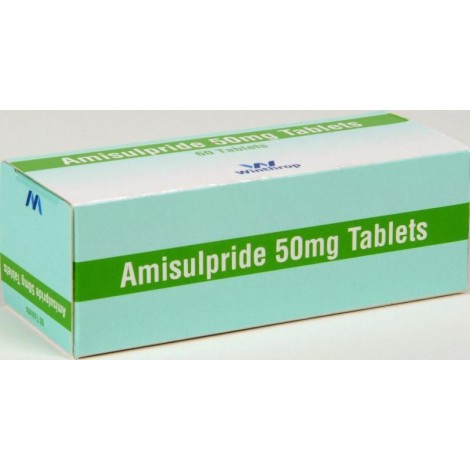Solian-Tabs Information
Solian-Tabs are known to contain an active ingredient called Amisulpride, which is actually a very common atypical anti-psychotic. It is generally used to treat schizophrenia. This substance is able to act on the patient’s brain, where it affects a neurotransmitter called dopamine. Dopamine is a chemical that is stored inside the nerve cells, being responsible for the connection between these cells. It is known that this kind of neurotransmitter is involved in regulating mood and behavior; a hyperactivity of this transmitter leads to schizophrenia, a disease that is associated with episodes of delusions and hallucinations, symptoms that are considered characteristic for this medical condition.
Solian-Tabs act by blocking the receptor inside the patient’s brain that dopamine works on. Generally, patients who are suffering from schizophrenia tent to experience positive symptoms such as hallucinations, or negative symptoms such as lack of emotion or social isolation. This kind of medication proved to be effective in relieving both symptoms of the disease, other medicines being effective only for the negative ones. For more information about Solian-Tabs you can consult a pharmacist or a specialized doctor.
Solian-Tabs Indications
There are cases in which Solian-Tabs can also be applied to treat episodes of mania in patients suffering from psychiatric diseases, bipolar affective disorder, and manic depression. You can also use it to treat other medical conditions than those listed in the medication guide, provided that you have your doctor’s approval.
Solian-Tabs Warnings
Solian-Tabs are known to cause drowsiness as a main side effect, so it is recommended not to perform activities that require special attention (activities such as operating machinery or driving), during your treatment. If you stop your therapy without your physician’s approval (even if you are already feeling better) your initial symptoms can reappear. The most common signs and symptoms that can arise after stopping the treatment can include nausea, vomiting, difficulty sleeping or unusual involuntary muscle movements. If the treatment must be stopped, it has to be done gradually, under close monitoring.
During the treatment, few patients can develop a rare side effect called tardive dyskinesia, characterized by abnormal movements of the lips, jaw, or tongue. If this applies to you, it is recommended to contact your doctor as soon as possible. The physician can advise you to stop taking the medicine, or he or she can simply adjust your dose. During treatment with Solian-Tabs, certain patients can develop a rare neuroleptic malignant syndrome, characterized by high fever, sweating, muscle stiffness, rapid breathing rate and drowsiness. Avoid taking the medicine if you are allergic to any ingredients in it, because in such cases, this treatment can worsen your initial medical status.
Before starting the treatment, you must inform your doctor if you are suffering from one of the following medical conditions: abnormal heart rhythm, slow heart rare, decreased levels of potassium, decreased kidney function, epilepsy and Parkinson’s disease. Do not apply Solian-Tabs to patients under 15 years of age, because they can develop severe mental illnesses, as side effects of the treatment. Avoid taking the medication if you are pregnant or planning to become pregnant, because this drug can cause birth defects to the baby. It also has the capacity to pass into the breast milk. Further data about the risks and the benefits of taking Solian-Tabs can be acquired if you consult with your doctor.
Solian-Tabs Intake Guidelines
Try to take the medication exactly as the doctor directed you to, without disregarding any of his or her directions (this is necessary if you want to achieve maximum benefits from the treatment). If you do make changes to your prescribed therapy course, you can risk worsening your initial medical status, besides compromising your treatment. In most of the cases, Solian-Tabs are prescribed to be taken with a glass of water. Do not take larger doses of this product or use it for longer periods of time than you were initially prescribed, because you can risk an overdose. For more information about intake guidelines associated with one’s therapy with Solian-Tabs, you can consult a pharmacist or a specialized doctor.
Solian-Tabs Dosage
Usually, the doses of Solian-Tabs are prescribed differently from one individual to another, depending on the severity of the medical condition, the strength of the medicine and how the patient’s body reacts to the treatment. All individuals are recommended to follow their doctor’s dosage directions; if they do not fully understand them, they should read the medication guide, as to obtain for further information. Consulting a pharmacist can also be helpful.
Solian-Tabs Overdose
If you suspect an overdose with Solian-Tabs, it is recommended to seek emergency medical attention. This product is known to cause severe complications when taken in larger doses, sometimes proving to be fatal.
Solian-Tabs Missed Dose
If you miss a dose of Solian-Tabs, try to take it as soon as you remember. But if it is the time to take the next dose, you can skip the missed one and continue with your normal dosing schedule. Do not take two doses of Solian-Tabs at the same time as to compensate the missed one because you can risk an overdose, worsening your disease. Taking the medication at regular hours, each day, can prevent missing your doses.
Solian-Tabs Side Effects
The most common side effects caused by Solian-Tabs can include the following: insomnia, anxiety, constipation, nausea, vomiting, abdominal pain, dry mouth, increased levels of prolactin in the blood, impotence, weight gain, increased salivation, low blood pressure, slow heart rate, and abnormal heart beat. This is not a complete list of the side effects Solian-Tabs can cause so it is better to contact the doctor if you experience any change in you general health status.
Solian-Tabs Drug Reactions
During treatment Solian-Tabs can interact with certain medications, altering their effects; the list of these medical remedies can include the following: Bepridil, Cisapride, Amiodarone, Sotalol, Quinidine and Disopyramide.


